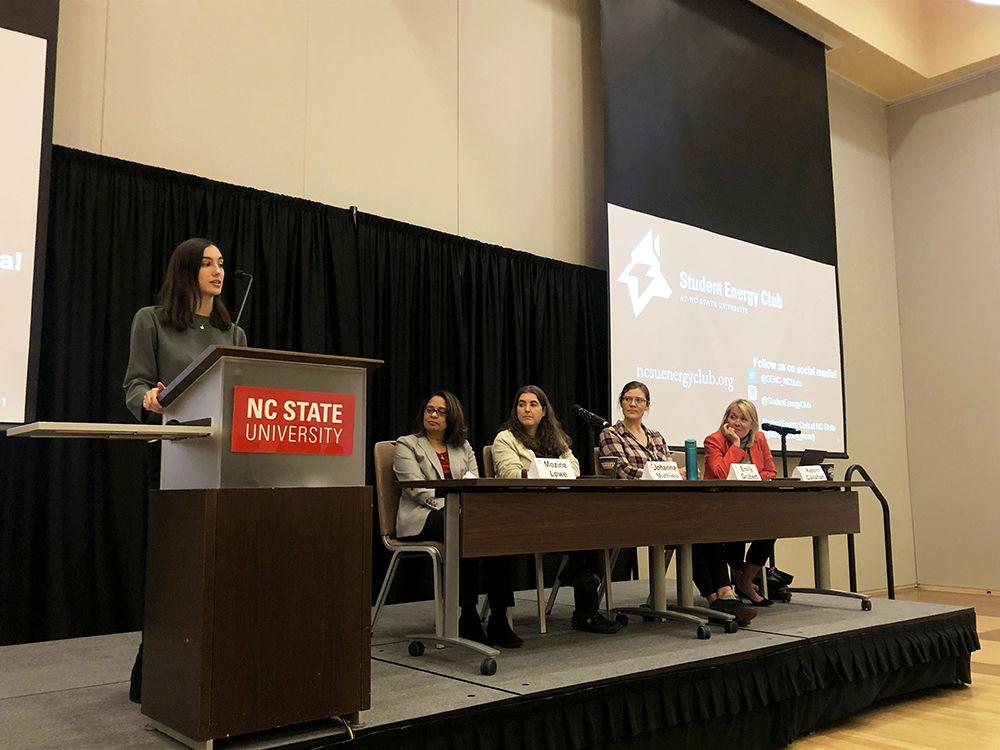On Tuesday afternoon, Student Energy Club hosted a panel called “Power Shift: The Future of Energy and the Women Shaping It,” with four panelist from varying fields.
The featured panelists were Mozine Lowe, executive director of the Center for Energy Education; Johanna Mathieu, an assistant professor of electrical engineering and computer science at the University of Michigan; Emily Grubert, an assistant professor for civil and environmental engineering at Georgia Tech; and Kateri Callahan, principal of dynamic energy strategies.
“Our mission is to integrate NC State’s energy community while also encouraging faculty, departments and students of all years and majors to participate in discussing and learning about the technologies, policies and people in the energy revolution,” said Martina Gonzalez Bertello, vice president of Student Energy Club. “This involves organizing a wide variety of events, bringing in the best energy experts on campus to educate them about the key challenges faced by the education system today.”
The panelists discussed major developments in the energy industry, such as systems integration, digitalization and electrification. They also discussed the future need for more workers in the energy sector, from engineers to policy makers.
“One company that I talked with, I can understand where they are coming from, because the industry is so young, that there aren’t a lot of trained professionals, folks with STEM-related careers in the energy sector,” Lowe said. “He said, ‘I’m looking for people who are knowledgeable about energy, about renewable energy, and people that are willing to learn. If I can get those two things, then I am a very happy person, and I want to meet them.’”
Lowe said companies she has interfaced with desire various kinds of engineers in the field. Additionally, companies search for people who can focus on urban planning, public policy, communication and marketing as the industry grows.
The panelists also discussed the reality of being women in a STEM industry.
“One thing I struggle with – and I know a lot of my colleagues struggle with it when I tell them about it– is the imposter syndrome, where you don’t think you belong or are accepted for some reason,” Mathieu said. “Once you have diversity, how do you make everybody feel equal? I like that we’re focused on it, but I’m not sure we know how to do it. We don’t know how to achieve it, but it’s something I think about a lot, and I don’t know how to overcome this imposter syndrome.”
Grubert said adding more representation in faculty and classrooms to facilitate more diversity in the long-term would benefit the entire industry; however, the reality of implementation is difficult. Grubert said at times, women feel pressure to say yes to things because women in engineering fields tend to be younger.
“I don’t think there’s a perfect solution,” Grubert said. “I do think the thing that is the most frustrating to watch is when it’s not necessarily coming from this very specific integrated impulse to make sure that there’s representation.”
Mathieu said because of their roles, there’s a lot of informal work faculty does to make sure students feel supported. She said she found support through mentors and advocates and now aims to be one for someone else. She also said it is important to know the history of what it’s like to be a member of an underrepresented community.
Grubert said as new fields of engineering emerge, it is easier to have a diverse team of people because there are no pre-existing networks.
Students who are interested in attending meetings and events hosted by the Student Energy Club can visit their website.








